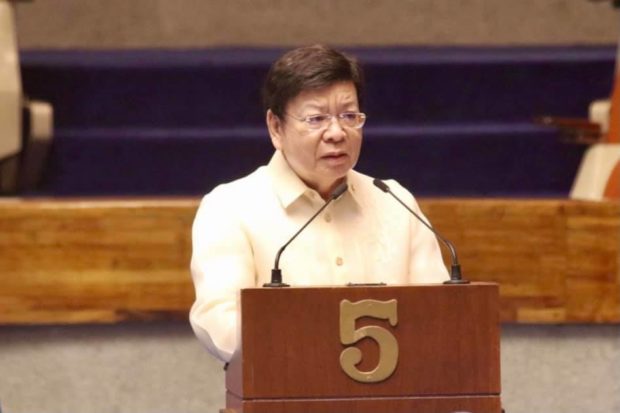
Sagip Party-list Rep. Rodante Marcoleta. PHOTO FROM FACEBOOK
MANILA, Philippines — Commission on Human Rights (CHR) Chairperson Richard Palpal-latoc has reminded Sagip party-list Rep. Rodante Marcoleta that criticizing the government is not a ground for red-tagging as it is a fundamental right protected by the 1987 Constitution.
During Tuesday’s deliberation on the CHR’s proposed 2025 budget at the House of Representatives, Marcoleta asked about red-tagging, or the practice of linking individuals, particularly human rights defenders and activists, to the communist movement.
Marcoleta said individuals can avoid being red-tagged by helping people and refraining from criticizing the government.
Palpal-latoc opposed it.
“You can help but only help, refrain from instigating against the government so that it cannot accuse us of anything, so that we cannot be red-tagged … Do not talk about the grievances against the government. We need to help each other here, and the government is doing what it can to protect our people,” Marcoleta said.
“I agree with that (government doing what it can), but one of the fundamental rights guaranteed by the Constitution is to redress government for grievances, your Honor … The issue with red-tagging is not the grievance because airing grievances, that’s a fundamental right,” Palpal-latoc said.
Marcoleta then said that there should be a dividing line between supporting the government and backing the communist armed movement, so that helping communities would not be misconstrued as sympathizing with the Communist Party of the Philippines (CPP) and its armed wing New People’s Army (NPA).
Palpal-latoc reminded Marcoleta that espousing communism, a sociopolitical ideology, is not also a reason for people to be linked to the armed rebellion.
“[Helping can be done] without instilling in the people the sentiments against the government. That’s the problem, that’s the point, that’s the dividing line. For us not to be red-tagged, we can keep ourselves from this side, we know the two sides. There should be a dividing line,” Marcoleta said.
“Yes, your Honor, but we have to be clear. What is red? Red is communism, your Honor. And the mere fact that you are espousing the ideology of communism does not mean you are violating any law. The problem lies in the fact that the CPP-NPA-NDF (National Democratic Front) was designated as a terrorist under the Anti-Terror Law,” Palpal-latoc explained.
Later in the hearing, Kabataan party-list Rep. Raoul Manuel — one of the several personalities often red-tagged for their activism — pointed out that red-tagging has been normalized to the point that it occurs even if people do not help communities or air grievances.
According to Manuel, he knows of an instance when a University of the Philippines (UP) student was red-tagged based on mere association with the academic institution.
“In fact, Madam Chair, there was someone who appealed to us, that when he was riding a jeepney, when he said that he would get off at a UP campus, he heard another passenger saying that he is part of the NPA. This means it has been normalized, that even if you have yet to criticize the government, just based on any stereotype or any shallow basis, you can be red-tagged,” he explained.
“That’s why Madam Chair, I don’t subscribe to the idea that you can help as long as you do not criticize. Because two things, Madam Chair, even non-government organizations that purely help communities, they get red-tagged or worse, tagged as terrorists,” he added.
Red-tagging has been a complaint of progressive groups. They said red-tagging endangers the lives of activists.
Last May 8, the Supreme Court (SC) said red-tagging is connected to the use of threats and intimidation, thereby putting a red-tagged individual at risk of enforced disappearance or extrajudicial killing.
In this situation, SC said, seeking a writ of amparo — a remedy available to any person whose right to life, liberty, and security has been violated or is threatened by a public official or a private individual — becomes necessary.
READ: Supreme Court: Red-tagging threatens one’s right to life, security


